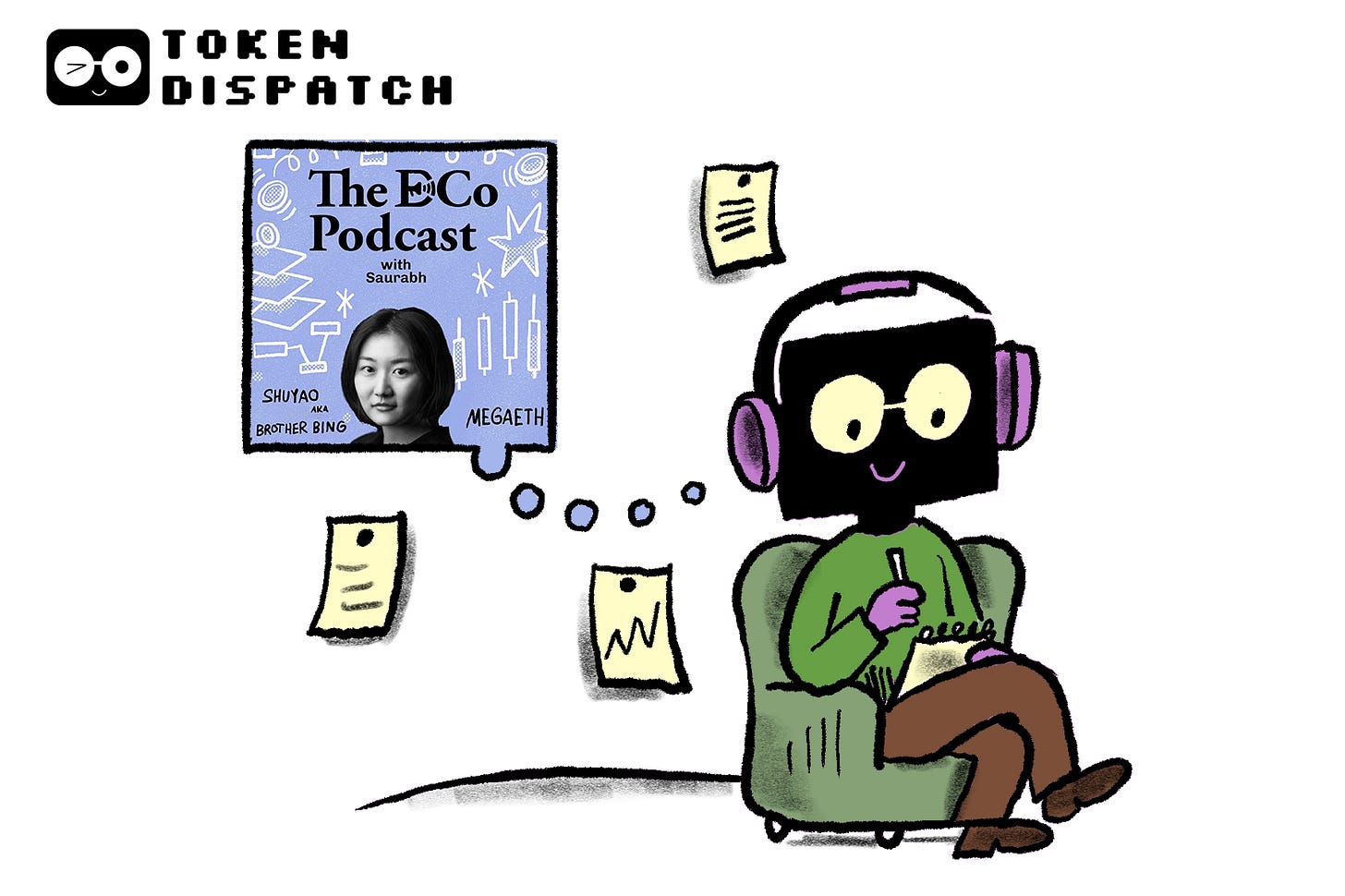Building for Humans, Not Purists 👥
When "not your keys, not your crypto" drives away adoption
Hello
Every Saturday, I dive into a podcast from our partners at Decentralised.co and share what stayed with me.
This week I reflect on the conversation between Saurabh Deshapande and Brother Bing (Shuyao), co-founder of MegaETH, hosted by our partners at Decentralised.co.
It’s that time of the year here in India. People are queuing up their investment details and having their chartered accountants on speed dial. Friends and family members are discussing their best investment strategies and portfolio ideas as they all prepare to file their income tax returns. A cousin narrated to me an ordeal she faced when she tried to put one foot into the crypto investment. My cousin had asked her “crypto-curious” friend to help her buy some crypto.
She wanted to try it out with a few hundred dollars. But the moment her friend began listing the wallet setups, backup phrases, gas fees and networks, her enthusiasm started to fade. Twenty minutes later, she blurted: “Isn’t there a simpler way?”
She got the standard crypto lecture about custody, decentralisation, being your own bank. She nodded politely, said she'd think about it, and promised to never bring it up ever again.
It was when I heard Brother Bing talk about consumer crypto that my cousin’s ordeal struck me. Her friend had been so focused on teaching her the "right" way to use crypto that she completely ignored what she actually wanted to do with it. She didn't need to understand Merkle trees or worry about censorship resistance. She just wanted to try something new with her money, the same way she might try a new restaurant or download a new app.
I've been thinking about this a lot lately because I see the same pattern everywhere in crypto. We've created this unspoken hierarchy where using anything less than the most decentralised, most censorship-resistant solution makes you somehow less legitimate. At the top sit the self-custody maximalists who run their own nodes. Below them are hardware wallet users. Further down are the MetaMask crowd. And at the bottom, barely worthy of acknowledgement, are the Coinbase users.
The thing is, my cousin's instinct about wanting to use a simpler, centralised platform was probably right for her use case. She clicks buy, she owns crypto. She clicks sell, she has dollars. No gas fees to calculate, no seed phrases to guard, no networks to switch between. It works because it hides all the complexity behind a familiar interface. Yet in our community, suggesting Coinbase feels like admitting defeat.
What I liked the most about the episode was Brother Bing's honesty in admitting what they didn’t set out to solve with MegaETH and the rationale behind that.
When pressed about MegaETH's centralised sequencer, she didn't promise eventual decentralisation. She explained why it was the right choice: "A lot of transactions don't require real-time censorship resistance. When World War 3 happens, we will all just go to Ethereum, Bitcoin - not other L2s. But for consumer use cases, they don't need to be on Ethereum. They could just be on a fast blockchain like MegaETH."
Listen to full episode here 👇🏾
This wasn't someone making compromises - it was someone making deliberate design choices based on what users actually need. And it made me realise I've been approaching crypto adoption completely backwards.
The problem I find in this space is that many builders or advocates in the space keep trying to convince people why they should care about decentralisation when they should be asking what they want to accomplish. My cousin didn't wake up thinking "I need censorship resistance." She woke up thinking "My friends are making money with this crypto thing, and I want to understand it."
Think about how we use restaurants. A Michelin-starred establishment and a food truck are both valid choices, but they serve different needs. The starred restaurant offers an uncompromising experience with ingredients flown in daily and preparation that takes hours. The food truck prioritises speed, convenience, and accessibility. Both can be great at what they do.
Crypto purists want everyone to eat at Michelin-starred restaurants because of the art around the food-making process there. But sometimes you just want a good burger without the ceremony.
When someone wants to bet on a streamer's behaviour or buy a digital collectible, they don't need the same security guarantees as someone moving institutional funds. They need speed, low costs, and an interface that doesn't require reading documentation.
I have been tracking new protocols in the crypto space, listening to founders talk about their products on podcast episodes and reading deep dives where the author explains a new, trending space in the crypto world.
I've started asking myself a simple question about any crypto application: If a normal person can't understand why they'd use this over Coinbase, have we solved the right problem yet? Most of the time, the honest answer is no. We're building for the crypto people who already exist, not for the people who don't use crypto yet.
Unlock Web3 Insights with Decentralised.co
Long-form stories trusted by the best in Web3. Senior executives from 140+ enterprises trust them to keep them updated on what's going on in crypto.
Good writing. In-depth conversations. Right in your inbox.
Subscribe to Decentralised.co
The winning applications will either be so much better that the complexity is worth it, or they'll abstract away the complexity entirely. Everything in between is fighting for a small market of people who want the benefits of decentralisation but don't want to pay the usability cost.
What bothers me about the current discourse is how we treat people who choose convenience over ideology. When someone uses a centralised exchange or a custodial wallet, we act like they're doing crypto wrong.
Of course, convenience isn’t without risk. The collapse of WazirX showed how fragile trust can be when users hand everything over to a centralised middleman. Yet, the answer isn’t to shame people into cold storage; it’s to make best practices feel natural, almost invisible.
Brother Bing mentioned applications that provide "emotional value" rather than financial utility - like betting on what colour will be trendy next year. These experiences can't exist in traditional finance, but they don't require maximum decentralisation to work either. They require good UX and fast execution. The crypto part should be invisible infrastructure, not the main selling point.
I think the future isn't Bitcoin maximalism or bank-controlled stablecoins. It's a spectrum of different tools for different needs, all connected by shared infrastructure. Some people will always want to be their own bank. Others just want to send money to friends without thinking about it. I don’t see a particular problem with the latter. Both can be served by crypto.
After listening to this episode, I realised my cousin’s crypto conversation with her friend was backwards from the start. Instead of explaining why decentralisation matters, the friend should have started with: "What do you want to do with it?" Maybe she would have ended up on Coinbase, and maybe that would have been perfect for her needs. The goal is to give people tools that actually improve their lives.
Next time someone asks me about crypto, I'm starting there. Not with the technology, but with the problem they're trying to solve. Because building for humans means starting with what humans actually want.
That's the difference between building for humans and building for purists.
That’s it for this week’s reflections.
Watching out for intuitive best practices,
Prathik
Listen to full episode here 👇🏾
Token Dispatch is a daily crypto newsletter handpicked and crafted with love by human bots. If you want to reach out to 200,000+ subscriber community of the Token Dispatch, you can explore the partnership opportunities with us 🙌
📩 Fill out this form to submit your details and book a meeting with us directly.
Disclaimer: This newsletter contains analysis and opinions of the author. Content is for informational purposes only, not financial advice. Trading crypto involves substantial risk - your capital is at risk. Do your own research.







Great piece, I'm one of the Coinbase users and have been several years. I love reading token dispatch newsletters in my inbox and attempting to stay up to date and learn more in a world of raising a family, work, traditional investing, and much more; meanwhile I'm also disconnecting from society and screens as much as possible. In other words, I'm a long hodl investor that wants simple. I do seek censorship resistance, I do seek government avoidance, but I need simple and entry level still in the crypto world. My friends who are beyond deep in tell me about wallets and this and that and the other and it makes my head spin. I appreciate the really deep head spinning stuff and hope to also be in there one day too, but I'm just not there yet, even after a few years buying and minimally selling on Coinbase. So I don't really know where I'm going with this response, but I guess I just wanted to say hey great piece, thanks for making me feel seen and thanks for always sharing your fresh perspective and knowledge. Keep going, I'll keep reading and learning.
Appreciate. I always have had to advise friends coming to crypto to ignore cold wallets etc etc for amounts under 25K. A simpler approach is a burner phone used only or trading and no browsing web, reading pdf etc.
CEX are beginning to link to L2 and DeFi that makes it simpler .
And Yes in WWIII we are going to BTC anyway